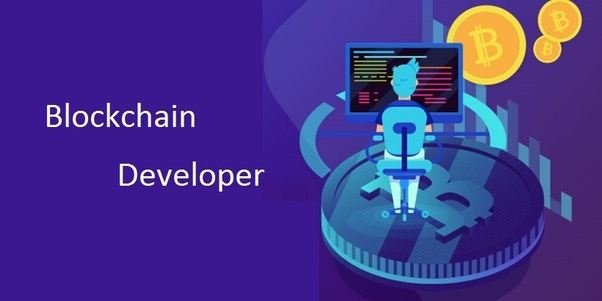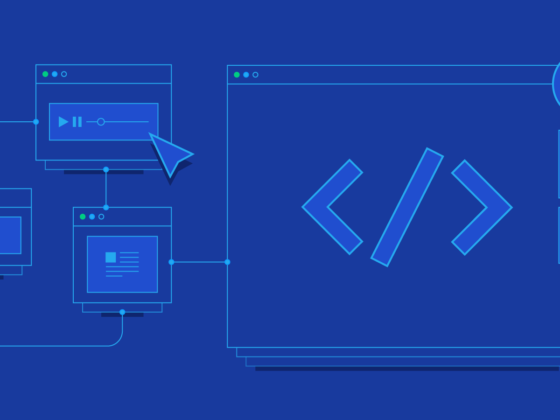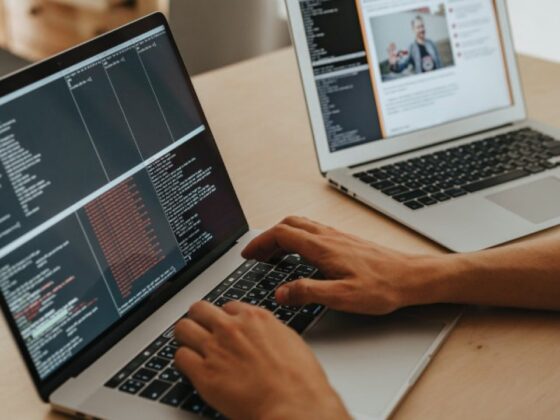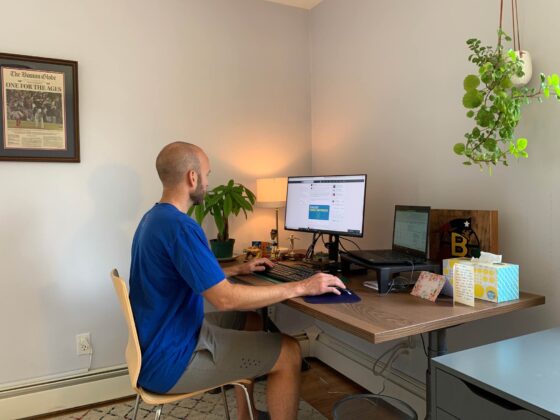Blockchain has quickly become one of the most emerging technology domains, with a global market set to grow to approximately $20 billion by 2025. Blockchain isn’t just all about Bitcoin; it’s also the technology that changes how the digital world functions. With tech giants like Samsung and IBM providing career opportunities for blockchain professionals, it’s quickly emerging, and many are increasingly keen to understand how to become blockchain developers.
Who is a blockchain developer?
Before we explain some key steps you can take to become a blockchain developer, it’s critical to understand who this specialist is. Blockchain developers are tech professionals who work in blockchain technology, and they are primarily responsible for all of the blockchain application life cycle. It means that they’re responsible not only for the research but also for the execution of the application. Creating the system architecture, making contracts, optimizing the protocols, and more are some of the responsibilities of a blockchain developer.
Why become a blockchain developer
Today, those who skillfully implement the basic concepts of blockchain are expensive to hire and even more difficult to find. The blockchain industry is growing, and there’s a ton of room for further growth and development in this technology. It means many companies search for talents who can benefit in the niche.
What to know for being a blockchain developer
Let’s dissect what it means to be a blockchain developer here: the types of blockchain developers, along with the skills required to excel in this competitive field that’s quickly rising to popularity:
There are two types of blockchain developers, and while both are involved in blockchain development, roles come with different responsibilities:
- Blockchain software developer: They build based on blockchain architecture and protocol, with the apps running on the blockchain. The role of a blockchain software developer is comparable to that of a web developer, who uses protocol and design to develop web applications. Blockchain software developers create DApps (both front-end and back-end) or decentralized applications.
- Core blockchain developer: They focus on the architecture development of a blockchain system. Core blockchain developers are mainly responsible for the security of their blockchain network.
Regardless of the type of blockchain developer, there are some core skills they all must acquire:
- Cryptography: This is the study of protocols that prevent unwanted parties from accessing your data.
- Cryptonomics: In addition to purely technical skills in programming, blockchain developers have to understand the socioeconomic mechanics of cryptocurrencies.
- Smart contracts: This makes it possible for two parties to exchange goods or services without the need for an intermediary.
- Data structures: Blockchain developers must have extensive knowledge of data structures, with the ability to build and implement networks.
- Blockchain architecture: This is the basis of being a blockchain developer — familiarity with the blockchain architecture. There are three kinds of blockchain architecture: consortium, private, and public.
- Web development: Learning web development is integral so that blockchain developers can build solid web apps that use blockchain technology.
In addition, the following are the languages used by blockchain developers:
- Java: Easy to learn, Java is popular among blockchain developers given its many qualities and capabilities of developing various complex solutions.
- C++: Bitcoin core was created using C++, so it’s considered a must-know language for any aspiring blockchain developer. Many tasks can be created on the blockchain using C++.
- Python: The versatility of Python, along with its various libraries, make it a popular programming language for blockchain.
- Simplicity: This is a new language built specifically for developing smart contracts.
7 steps to become a blockchain developer
- Education: To become a blockchain developer, you need a background in Computer Science or Information Technology — whether from a university/college or coding bootcamp.
- Get equipped with the required tech skills: In addition to your educational background in the field, being armed with the technical know-how is key to succeeding as a blockchain developer. This includes programming languages, data structures, databases and networking, and cryptography.
- Have a solid understanding of blockchain technology: While your education and technical skills are important, what’s also critical is to have a solid understanding of the blockchain technology fundamentals. This includes grasping concepts like Consensus, Hash functions, Distributed ledger technology, etc. A knowledge of Bitcoin is also crucial, in addition to concepts like public and private approaches, decentralization, and more.
- Cryptonomics: Learning Cryptonomics is a must for getting into blockchain development. This is all about understanding the economical concepts and methodologies behind the different cryptocurrencies. Terms like transaction fees, mining, transaction lifecycle using Bitcoin, and many more are key to learning and understanding for blockchain developers.
- Knowledge of Ethereum and DApps: Another integral aspect of blockchain development is Ethereum, which is an open-source decentralized blockchain network used for running spart protocols — those for the development of smart contracts and Distributed Applications (DApps), without setbacks like downtime, fraud, third-party interference, etc. DApps are the software systems developed on blockchain platforms such as Ethereum and others.
- Knowledge of smart contracts and solidity: Learning the fundamentals of smart contracts and solidity is key for blockchain developers. Smart contracts are all about the instructions used for automation purposes, with three major components to them: deterministic, terminable, and isolation. Solidity is a statically typed, high-level language used to write smart contracts.
- Experience: After grasping the main concepts of blockchain, gathering some hands-on experience in blockchain development is key. Starting with an internship or a training program is a good idea, giving you a headstart with the technology, tools, and platforms associated with blockchain development.
Where to learn blockchain
While there are a couple of free online resources that can give you some background knowledge in blockchain, committing to degrees/certificates either through online courses or a coding bootcamp will prove more beneficial.
Below are some options for learning blockchain:
- Product School: Offering industry-recognized credentials, Product School’s certificate programs include subjects in blockchain and crypto.
Approximate cost: $4,199 to $9,999
Duration: 4-8 weeks
- ChainShot: The ChainShot Ethereum Developer Bootcamp will fast-track your Ethereum developer career, providing you with all the know-how to becoming a smart contracts developer.
Approximate cost: $3,000
Duration: $10,000
- B9lab Academy: B9lab Academy offers a total of seven classes that teach blockchain technologies and decentralized applications. It offers free, one-week introduction classes, in addition to paid classes.
Approximate cost: €450 to €2,350
Duration: 1 – 5 weeks
- Bit Degree: BitDegree is an online educational platform focusing on IT and digital skills for the workplace. It’s a blockchain powered educational platform, allowing students to earn cryptocurrency tokens while they learn.
Approximate cost: N/A
Duration: 1-2 weeks
- Blockgeeks: Blockgeeks conveniently offers online, self-paced training and Accelerated Programs in blockchain development, as well as non-technical blockchain education like Blockchain Law, Blockchain Business, etc. It’s a technology-centric educational, knowledge sharing, and ecosystem development platform.
Approximate cost: $997
Duration: 5 weeks
- Columbia Engineering Boot Camps: Columbia Engineering Boot Camps offer a range of bootcamps, covering subjects in blockchain.
Approximate cost: $10,495 to $14,995
Duration: 18-24 weeks
- The Blockchain Academy: The Blockchain Academy offers a 6-week, full time program in blockchain technology. At the end of the in-person immersive course, participants will be able to implement powerful blockchain applications.
Approximate cost: $15,000
Duration: 6 weeks
- The Den: The DEN (Decentralized Education Nexus) is a Blockchain Career Accelerator in Silicon Valley, CA. They provide full-time immersive bootcamps, evening part-time professional development courses, and corporate programs.
Approximate cost: $2,500 to $4,500
Duration: 1-6 weeks
Wrapping up
As seen throughout this article, blockchain is a digital ledger of transactions duplicated and distributed across the entire network of computer systems. If you’re an aspiring blockchain developer, now is the time to invest in enrolling in a certificate or bootcamp program. Here, you’ll learn all the fundamental skills you need to stay ahead of the curve in this challenging sector.
Remember:
To grasp the essential concepts of blockchain, from cryptography, cryptonomics, Ethereum, DApps, smart contracts, data structures, and more, you must also possess the core skills required to succeed in any computer science/IT field. It includes a robust knowledge of web development, along with a solid familiarity with programming languages like Python, C++, Java, Simplicity, and more.
It all comes down to knowing the steps behind how to become a blockchain developer and taking the necessary action you need to become one step closer to achieving this. With a solid education in the field of computer science/IT, coupled with the education, you’ll be able to step into the real world of blockchain and gain some hands-on experience in this competitive environment.










